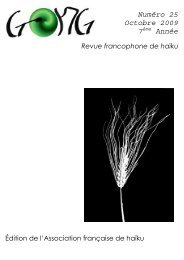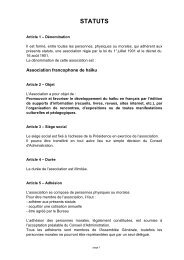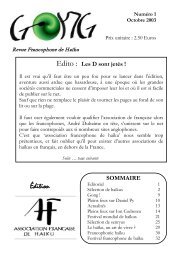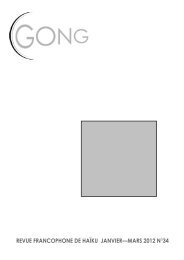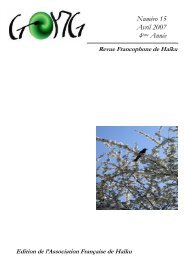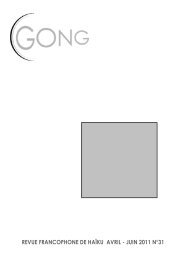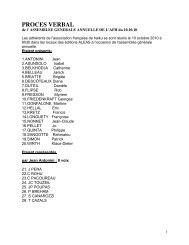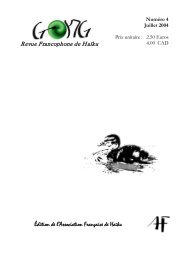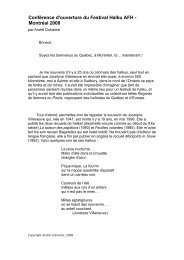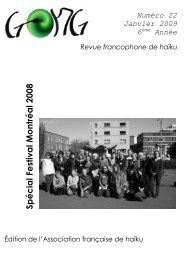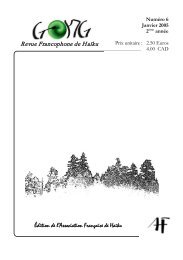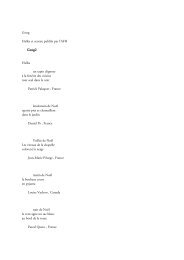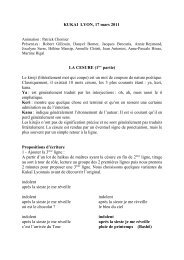les résultats (janvier 2012) - Association Francophone de Haiku
les résultats (janvier 2012) - Association Francophone de Haiku
les résultats (janvier 2012) - Association Francophone de Haiku
Create successful ePaper yourself
Turn your PDF publications into a flip-book with our unique Google optimized e-Paper software.
InterviewThe winner of the International Section of the 15th Mainichi <strong>Haiku</strong> Contest is AnisoaraIordache, a resi<strong>de</strong>nt of Constanta, Romania. In an interview with the Mainichi <strong>Haiku</strong> Office,Iordache speaks about her life in Romania and her winning haiku.—Where were you born and where did you grow up? How do you usually spend your time inConstanta?I was born in the winter of 1956. Since childhood I've been attracted to mathematics, as wellas to painting and drawing. I studied mathematics at the University of Bucharest from 1976to 1980, and taught mathematics for the 31 years that followed. I am married and have twosons: One is a stu<strong>de</strong>nt at the Faculty of Automatic Control and Computers at the University" POLITECHNICA" of Bucharest; the other is still in high school. When I am not busy withfamily life, I have <strong>de</strong>dicated my free time to poetry and drawing, using computer graphics.Since 2004, I have posted poems on literary sites.—To what literary or haiku circ<strong>les</strong> do you belong?In the past, I knew very little about Japanese poetry. But in 2005, the publisher RaduHuluban launched a haiku contest. Through interacion with the participants I was able tofind out about the ru<strong>les</strong> as well as the aesthetic qualities of haiku. The same year, professorTraian Atanasiu created a literary group called "Romanian <strong>Haiku</strong>" and my haiku wereselected to appear in the group’s first anthology released in 2007.—Have you won any literary prizes in the past?I had the pleasure and honor of receiving the 2010 Grand Prix at the international haikufestival "Lucian Blaga."—How did you first come into contact with the world of haiku? What sparked your interest?As I mentioned earlier, I first encountered haiku in 2005. At the beginning, my poems had avisual color, and in essence they showed close similarities with the world of haikuexpression. I met Romanian haiku masters such as Eduard Tara, Magdalena Dale, andVasile Moldovan, and I atten<strong>de</strong>d the International Constanta <strong>Haiku</strong> Conference. At thatevent, my stu<strong>de</strong>nts also created their own haiku.—Where does your inspiration for your haiku come from?I think music is a language of light. In the <strong>de</strong>pth of my heart there is a secret "place ofreflection" where the sounds produce an eternal source of poetry.—What advice would you give to someone thinking about getting into haiku?I think the most important thing is to capture the "spark" that ignites the fire. I believe achild can easily appreciate the beauty of a haiku, but a bitter heart, full of vice, will lookupon the world of haiku with indifference.—Please give us a comment as the winner of the International Section of the contest this year.To me a haiku is a drop of living water that refreshes and animates the soul. In this fleetinglife a piece of poetry can allow us to meet friends. We must try to be more un<strong>de</strong>rstanding,patient and affectionate. Only in this way will we achieve world harmony. I am just a smallstone at the foot of Mount Fuji.Thank you for appreciating my poem and I wish a spring of cherry blossoms will visit all ofyour hearts.* English translations by Aaron Baldwin(8)



